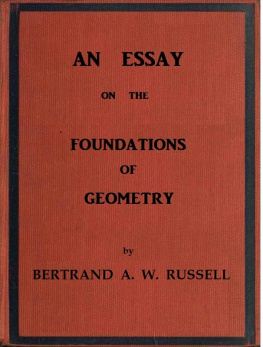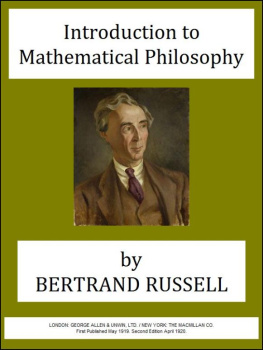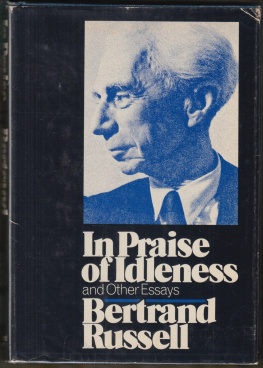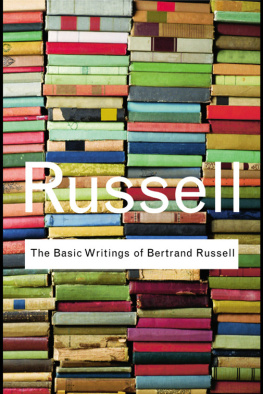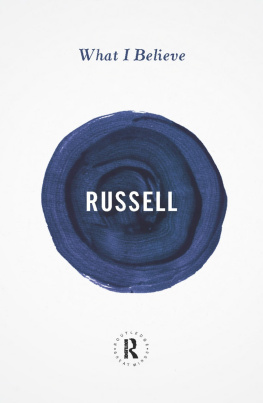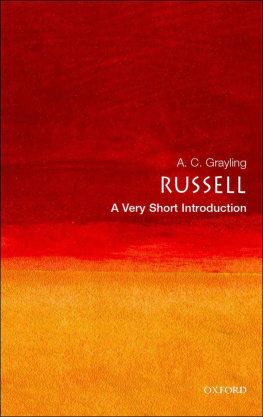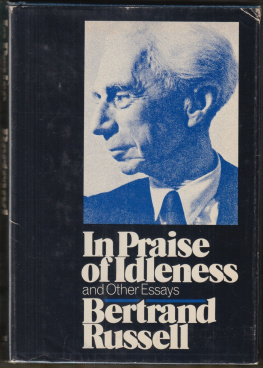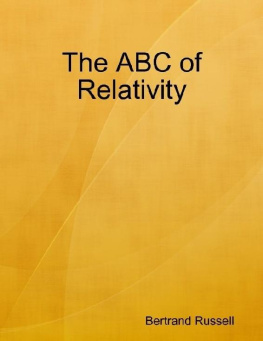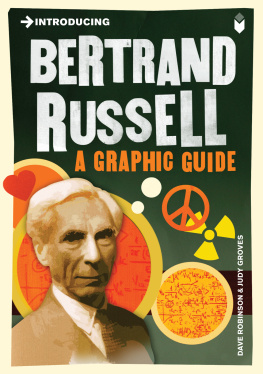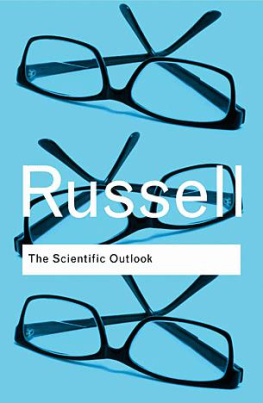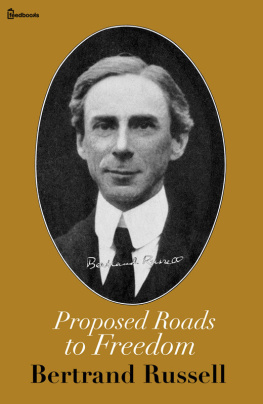Bertrand Russell - An essay on the foundations of geometry
Here you can read online Bertrand Russell - An essay on the foundations of geometry full text of the book (entire story) in english for free. Download pdf and epub, get meaning, cover and reviews about this ebook. year: 2016, genre: Science. Description of the work, (preface) as well as reviews are available. Best literature library LitArk.com created for fans of good reading and offers a wide selection of genres:
Romance novel
Science fiction
Adventure
Detective
Science
History
Home and family
Prose
Art
Politics
Computer
Non-fiction
Religion
Business
Children
Humor
Choose a favorite category and find really read worthwhile books. Enjoy immersion in the world of imagination, feel the emotions of the characters or learn something new for yourself, make an fascinating discovery.
- Book:An essay on the foundations of geometry
- Author:
- Genre:
- Year:2016
- Rating:5 / 5
- Favourites:Add to favourites
- Your mark:
- 100
- 1
- 2
- 3
- 4
- 5
An essay on the foundations of geometry: summary, description and annotation
We offer to read an annotation, description, summary or preface (depends on what the author of the book "An essay on the foundations of geometry" wrote himself). If you haven't found the necessary information about the book — write in the comments, we will try to find it.
An essay on the foundations of geometry — read online for free the complete book (whole text) full work
Below is the text of the book, divided by pages. System saving the place of the last page read, allows you to conveniently read the book "An essay on the foundations of geometry" online for free, without having to search again every time where you left off. Put a bookmark, and you can go to the page where you finished reading at any time.
Font size:
Interval:
Bookmark:
The Project Gutenberg EBook of An essay on the foundations of geometry, by
Bertrand Russell
This eBook is for the use of anyone anywhere in the United States and most
other parts of the world at no cost and with almost no restrictions
whatsoever. You may copy it, give it away or re-use it under the terms of
the Project Gutenberg License included with this eBook or online at
www.gutenberg.org. If you are not located in the United States, you'll have
to check the laws of the country where you are located before using this ebook.
Title: An essay on the foundations of geometry
Author: Bertrand Russell
Release Date: May 17, 2016 [EBook #52091]
Language: English
*** START OF THIS PROJECT GUTENBERG EBOOK ESSAY ON FOUNDATIONS OF GEOMETRY ***
Produced by Adrian Mastronardi, John Campbell and the
Online Distributed Proofreading Team at http://www.pgdp.net
(This file was produced from images generously made
available by The Internet Archive)
TRANSCRIBER'S NOTE
The cover image was created by the transcriber and is placed in the public domain.
Obvious typographical errors and punctuation errors have been corrected after careful comparison with other occurrences within the text and consultation of external sources.
More detail can be found at the .
THE
FOUNDATIONS OF GEOMETRY.
London: C. J. CLAY AND SONS,
CAMBRIDGE UNIVERSITY PRESS WAREHOUSE,
AVE MARIA LANE.
Glasgow: 263, ARGYLE STREET.

Leipzig: F. A. BROCKHAUS.
New York: THE MACMILLAN COMPANY.
Bombay: GEORGE BELL AND SONS.
ON THE
FOUNDATIONS OF GEOMETRY
BY
BERTRAND A. W. RUSSELL. M.A.
FELLOW OF TRINITY COLLEGE, CAMBRIDGE.
CAMBRIDGE:
AT THE UNIVERSITY PRESS.
1897
[All Rights reserved.]
Cambridge:
PRINTED BY J. AND C. F. CLAY,
AT THE UNIVERSITY PRESS.
The present work is based on a dissertation submitted at the Fellowship Examination of Trinity College, Cambridge, in the year 1895. Section B of the third chapter is in the main a reprint, with some serious alterations, of an article in Mind (New Series, No. 17). The substance of the book has been given in the form of lectures at the Johns Hopkins University, Baltimore, and at Bryn Mawr College, Pennsylvania.
My chief obligation is to Professor Klein. Throughout the first chapter, I have found his "Lectures on non-Euclidean Geometry" an invaluable guide; I have accepted from him the division of Metageometry into three periods, and have found my historical work much lightened by his references to previous writers. In Logic, I have learnt most from Mr Bradley, and next to him, from Sigwart and Dr Bosanquet. On several important points, I have derived useful suggestions from Professor James's "Principles of Psychology."
My thanks are due to Mr G. F. Stout and Mr A. N. Whitehead for kindly reading my proofs, and helping me by many useful criticisms. To Mr Whitehead I owe, also, the inestimable assistance of constant criticism and suggestion throughout the course of construction, especially as regards the philosophical importance of projective Geometry.
Haslemere.
May, 1897.
TO
JOHN McTAGGART ELLIS McTAGGART
TO WHOSE DISCOURSE AND FRIENDSHIP IS OWING
THE EXISTENCE OF THIS BOOK.
| INTRODUCTION. | |
| OUR PROBLEM DEFINED BY ITS RELATIONS TO LOGIC, PSYCHOLOGY AND MATHEMATICS. | |
| PAGE | |
| The problem first received a modern form through Kant, who connected the priori with the subjective | 1 |
| A mental state is subjective, for Psychology, when its immediate cause does not lie in the outer world | 2 |
| A piece of knowledge is priori, for Epistemology, when without it knowledge would be impossible | 2 |
| The subjective and the priori belong respectively to Psychology and to Epistemology. The latter alone will be investigated in this essay | 3 |
| My test of the priori will be purely logical: what knowledge is necessary for experience? | 3 |
| But since the necessary is hypothetical, we must include, in the priori, the ground of necessity | 4 |
| This may be the essential postulate of our science, or the element, in the subject-matter, which is necessary to experience; | 4 |
| Which, however, are both at bottom the same ground | 5 |
| Forecast of the work | 5 |
| CHAPTER I. | |
| A SHORT HISTORY OF METAGEOMETRY. | |
| Metageometry began by rejecting the axiom of parallels | 7 |
| Its history may be divided into three periods: the synthetic, the metrical and the projective | 7 |
| The first period was inaugurated by Gauss, | 10 |
| Whose suggestions were developed independently by Lobatchewsky | 10 |
| And Bolyai | 11 |
| The purpose of all three was to show that the axiom of parallels could not be deduced from the others, since its denial did not lead to contradictions | 12 |
| The second period had a more philosophical aim, and was inspired chiefly by Gauss and Herbart | 13 |
| The first work of this period, that of Riemann, invented two new conceptions: | 14 |
| The first, that of a manifold, is a class-conception, containing space as a species, | 14 |
| And defined as such that its determinations form a collection of magnitudes | 15 |
| The second, the measure of curvature of a manifold, grew out of curvature in curves and surfaces | 16 |
| By means of Gauss's analytical formula for the curvature of surfaces, | 19 |
| Which enables us to define a constant measure of curvature of a three-dimensional space without reference to a fourth dimension | 20 |
| The main result of Riemann's mathematical work was to show that, if magnitudes are independent of place, the measure of curvature of space must be constant | 21 |
| Helmholtz, who was more of a philosopher than a mathematician, | 22 |
| Gave a new but incorrect formulation of the essential axioms, | 23 |
| And deduced the quadratic formula for the infinitesimal arc, which Riemann had assumed | 24 |
| Beltrami gave Lobatchewsky's planimetry a Euclidean interpretation, | 25 |
| Which is analogous to Cayley's theory of distance; | 26 |
| And dealt with n-dimensional spaces of constant negative curvature | 27 |
| The third period abandons the metrical methods of the second, and extrudes the notion of spatial quantity | 27 |
| Cayley reduced metrical properties to projective properties, relative to a certain conic or quadric, the Absolute; | 28 |
| And Klein showed that the Euclidean or non-Euclidean systems result, according to the nature of the Absolute; | 29 |
| Hence Euclidean space appeared to give rise to all the kinds of Geometry, and the question, which is true, appeared reduced to one of convention | 30 |
| But this view is due to a confusion as to the nature of the coordinates employed | 30 |
| Projective coordinates have been regarded as dependent on distance, and thus really metrical |
Font size:
Interval:
Bookmark:
Similar books «An essay on the foundations of geometry»
Look at similar books to An essay on the foundations of geometry. We have selected literature similar in name and meaning in the hope of providing readers with more options to find new, interesting, not yet read works.
Discussion, reviews of the book An essay on the foundations of geometry and just readers' own opinions. Leave your comments, write what you think about the work, its meaning or the main characters. Specify what exactly you liked and what you didn't like, and why you think so.

